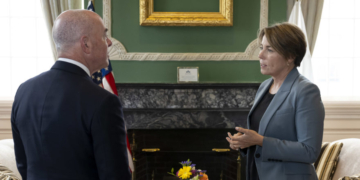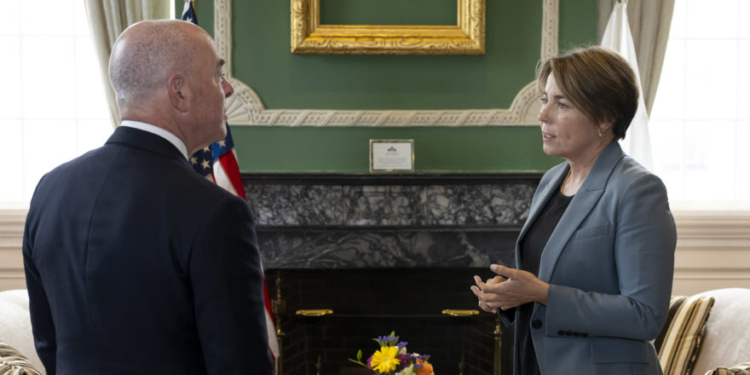A top Immigration and Customs Enforcement (ICE) official listed policies in Massachusetts that restrict cooperation between federal immigration authorities and local law enforcement after Democrat Gov. Maura Healey claimed it wasn’t a “sanctuary state.”
Healey, who has presided over a staggering illegal immigration crisis into the state since entering office in 2023, defended her government’s massive expenditures on emergency shelter housing for migrants and other homeless individuals during an interview with the Boston Herald. The Democratic governor also pushed back on conservative criticism that Massachusetts has policies in place that protect illegal migrant criminals.
“We’re not a sanctuary state,” Healey told the newspaper. “We have a limited budget, and the emergency shelter system really was meant for Massachusetts families who were experiencing homelessness or housing insecurity and needed a place to go that was temporary.”
While the governor said that she believes “violent criminals should be deported if they’re not here lawfully” and federal and local law enforcement officials should cooperate in order reach this goal, she added that she doesn’t like the idea of “showing up at a hotel, and rounding up groups of people who are suspected to be here unlawfully, who are here working, and just deporting all of them without a process.”
However, Todd Lyons, who serves as the Enforcement and Removal Operations (ERO) Boston field office director for ICE, pointed out that Massachusetts “can do more to remove egregious foreign-born public safety threats from our neighborhoods by simply notifying ERO when they are in custody” in follow-up comments to the Boston Herald. While not addressing the Democratic governor’s comments directly, Lyons noted that the state is home to “so many cities and municipalities” that openly tout sanctuary policies.
Lyons went on to tell the paper it’s a “big problem” that state police cannot work with ERO and that Massachusetts’ officials do not share information, including Registry of Motor Vehicles data. When asked about Healey’s comments regarding hotel arrests, Lyons said deportation officers have “never shown up at a hotel, shelter or any other place just to round up people who may be here illegally.”
While there is no official definition of a “sanctuary” jurisdiction, it is generally regarded as any city or municipality that has restrictions on local law enforcement’s ability to cooperate or otherwise assist federal immigration authorities. This typically takes the form of laws or court decisions that largely prevent local officials from notifying ICE about an illegal migrant in their custody or holding them in custody until an ICE agent is able to arrive on scene to make an apprehension.
The Center for Immigration Studies, a Washington-D.C.,-based group that advocates for stricter immigration laws, lists Massachusetts as a sanctuary state, pointing specifically to a 2017 court decision that prohibits local officers from arresting and holding an individual solely on the basis of an immigration detainer. Other organizations, such as America First Legal, have identified Healey as a purveyor of sanctuary policies.
Many municipalities in the state also restrict ICE cooperation. Amherst, Cambridge, Chelsea, Concord, Newton, Northampton and Somerville have all been labeled in the past as sanctuary jurisdictions, and the Boston mayor recently reasserted the city’s sanctuary status following President-elect Donald Trump’s election victory.
The immigration crisis taking place under the outgoing Biden administration has hit Massachusetts particularly hard. Around 355,000 illegal migrants and other inadmissible foreign nationals live in the state, and approximately 50,000 have arrived since 2021. A state commission report released in November expects the state to spend over $1 billion on sheltering migrants and other families in fiscal year 2025.
All content created by the Daily Caller News Foundation, an independent and nonpartisan newswire service, is available without charge to any legitimate news publisher that can provide a large audience. All republished articles must include our logo, our reporter’s byline and their DCNF affiliation. For any questions about our guidelines or partnering with us, please contact [email protected].



























 Continue with Google
Continue with Google